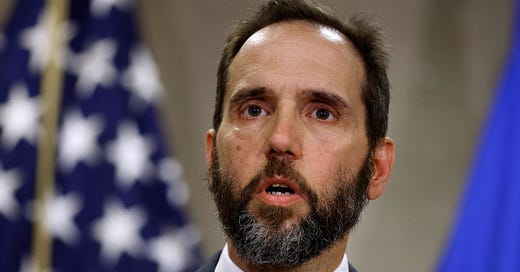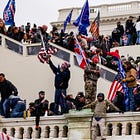Welcome back to the Weekend Wrap! Let’s get caught up on the white collar highlights:
Trump Prosecutions
D.C. Federal Case - January 6 Allegations
On Tuesday a federal grand jury returned a superseding indictment of Donald Trump. The four charges remain the same: conspiracy to defraud the United States, conspiracy to obstruct a Congressional proceeding, obstruction of a Congressional proceeding, and conspiracy to violate civil rights. But the new indictment is about nine pages shorter than the original. It represents Jack Smith’s effort to respond to the Supreme Court’s immunity decision last June.
Smith has scrubbed the indictment of most allegations that are likely to be prohibited based on the newly-announced doctrine of presidential immunity. By superseding to drop those allegations, he has headed off arguments before Judge Chutkan over whether or not those allegations could be part of his case. The parties will still have arguments over immunity, to be sure, but by taking a number of allegations off the table Smith has narrowed the playing field and streamlined the prosecution.
Special Counsel Jack Smith (Chip Somodevilla/Getty Images)
This was a smart move on Smith’s part. He’s taken a lot of wind out of the defense sails by saying, basically, “OK, those allegations that you claim are subject to immunity? I don’t need them anyway. Let’s rock and roll.” It gives him a much better chance of moving the case forward and not getting tied up in more lengthy appeals over immunity — assuming Trump doesn’t win the election, of course.
And Smith still has plenty of case left. These cuts hurt, but I don’t think they are fatal. The original indictment identified five different “manner and means” through which Trump and his co-conspirators attempted to overturn the election. The superseding indictment drops one of them: the efforts to use the Justice Department to pressure state officials to overturn their election results. The others, including the fake electors scheme and exploiting the violence at the Capitol, still remain. They should be more than enough for Smith to prove his case.
Here’s a summary of the major changes in the superseding indictment:
The biggest change, as I just mentioned, is dropping all allegations about efforts to use the Justice Department to convince states that there was fraud in their election and that they should overturn the results. It also drops the reference to “Co-conspirator #4” — Jeffrey Clark, the senior DOJ official whom Trump wanted to make acting Attorney General to help carry out the scheme. The Supreme Court held that Trump’s discussions with DOJ about potential election fraud and what kind of investigations to conduct were part of his core executive functions and were entitled to absolute immunity. So now those allegations are gone.
The superseding indictment also drops all references to Trump being told by his own administration officials, including his Director of National Intelligence, senior DOJ officials, and senior White House attorneys, that there was no basis for his claims of election fraud. Instead it highlights how Trump knew that from other sources, including state and local officials and his failure in dozens of lawsuits challenging the election. This is to head off any fights over whether particular communications with Trump’s own senior staff are subject to immunity.
It adds language to the description of the remaining unindicted co-conspirators, such as Rudy Giuliani and John Eastman, to highlight that they were private attorneys working for Trump and the campaign and did not hold any government position.
It removes allegations of things that Trump did in the oval office, including sending some Tweets.
It tweaks language about Trump and Mike Pence to describe them primarily as candidates, not as the incumbent president and vice-president, to emphasize that Trump’s actions were the personal acts of a candidate and not the official acts of a president.
The superseding indictment primarily represents a shift in focus. The basic allegations are the same. But the indictment now emphasizes the efforts to influence state and local officials to overturn their election results, the fake electors scheme, pressuring the vice president (in his role as president of the Senate), and exploiting the violence at the Capitol to disrupt the electoral count. All of these should be considered campaign-related actions of a candidate, not official acts of the president. The president has no official role in administering state elections or in certifying the electoral vote count by Congress. This shift in focus gives Smith the best shot at withstanding challenges based on presidential immunity.
The biggest remaining fights will be over the allegations regarding Trump’s efforts to pressure Mike Pence to throw out the election results, which are still a central part of the case. Because Pence’s presiding over the vote count was in his constitutional legislative role as president of the Senate, the government will argue that Trump’s communications with Pence regarding that role were not immune official acts. The Supreme Court said that Trump’s dealings with his Vice President were “at least presumptively immune” but that the prosecution could rebut that presumption by demonstrating a prosecution based on these particular acts would not “pose any dangers of intrusion on the function and authority of the Executive Branch.”
Responding to Fischer: The superseding indictment also tweaks the language surrounding the obstruction charges to respond to the Supreme Court’s decision in Fischer. You’ll recall from our earlier discussions here that in Fischer the Supreme Court held an obstruction charge under 18 USC 1512(c) requires proof that the defendant sought to impair the availability or integrity of evidence in a proceeding — staging a riot to shut down a proceeding is not enough.
I’ve argued all along that the obstruction charges against Trump should survive Fischer. The fake electors scheme involves a plot to submit false documents as ballots to be counted during the Congressional proceeding to certify the election, and the Supreme Court expressly said that submitting false documents in a proceeding would still be covered by the statute. In addition, the riot put the integrity of the actual ballots in danger and threatened to impair or defeat the ability of those ballots to be counted — threatened evidence impairment that also should be covered.
The superseding indictment adds some language to emphasize that the nature of the Congressional proceeding was the counting of physical ballots and that the actions of Trump and his co-conspirators threatened the integrity and availability of the evidence used in that proceeding.
For example, in paragraph 86 which describes Trump’s speech on the ellipse on January 6, Smith added language highlighting Trump’s knowledge of the nature of the proceeding:
A new paragraph 90 also highlights that the nature of the proceeding was the opening and counting of physical ballots from the states. (Note also the specific reference to the Vice President’s role as “President of the Senate” - in other words, he is acting in his constitutional legislative capacity, not as a member of the executive branch whose actions might be subject to presidential immunity.)
The indictment also adds new language noting that when the rioters breached the Capitol and legislators and staff were forced to flee, staffers took with them the electoral ballots that were being counted - emphasizing that the actions of Trump and the rioters had put that physical evidence in danger:
This new language all serves to strengthen the government’s argument that, even after Fischer, Trump’s actions constitute a conspiracy to obstruct the Congressional proceeding because it involved 1) submission of false evidence (the fake electors scheme), and 2) a threat to the integrity and availability of the true electoral ballots, which were central to the proceeding.
I wrote here a few weeks ago that I hoped that Smith would supersede before Labor Day not only to respond to the immunity decision but also to add some of the unindicted co-conspirators as indicted defendants. Smith chose not to indict the other defendants — yet. I still expect that will come sometime next year (he has until January 2026 before the statute of limitations runs out). For now he remains focused solely on Trump.
Finally, when announcing the filing of the superseding indictment, Smith went out of his way to note that the indictment was returned by “a new grand jury that had not previously heard evidence in this case.” This will help to head off any claims that, even if it is scrubbed of immune evidence, the entire indictment still must be dismissed because the grand jury improperly heard and may have relied upon evidence that is subject to presidential immunity (such as Trump’s dealings with Pence).
Joint status report: As required by Judge Chutkan, the parties filed a joint status report late on Friday evening to state their positions on how the case should proceed. Not surprisingly, they don’t agree on much. Smith argues that Chutkan should decide all immunity issues first because the resolution of those issues likely will shape the remaining disputes. If the defense is going to file additional motions to dismiss, Smith proposes that the briefing schedule be concurrent with the briefing on immunity, so that all disputes can be fully briefed relatively quickly and then the Judge can work through them. Smith didn’t propose a timetable, but said the government is prepared to file its opening brief on immunity “promptly” at any time the court deems appropriate.
The defense argues that the next few weeks should be spent primarily on discovery issues. They claim there may be additional discovery the government is now required to provide related to the immunity questions. They object to Smith’s proposal to begin with a brief arguing about immunity, claiming it is up to the defense to first file a challenge based on immunity and then Smith can respond. They say they will file multiple motions to dismiss in addition to a motion based on immunity, including a motion arguing that Jack Smith’s appointment was unconstitutional (the basis for Judge Cannon’s dismissal of the Florida case), a motion that then entire indictment must be dismissed because the grand jury was exposed to evidence subject to presidential immunity, and a motion to dismiss the obstruction counts based on Fischer. They proposed a timetable where briefing on the various motions would be complete by January and hearings and other proceedings would take place as needed in “Spring-Fall 2025.”
Judge Chutkan will hold a status conference this Thursday. After that we should have a better idea of how she wants the case to proceed.
New York State Case - Hush Money/False Business Records
Keep reading with a 7-day free trial
Subscribe to Sidebars to keep reading this post and get 7 days of free access to the full post archives.








